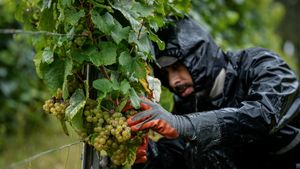Since its debut on June 20, 2018, Yellowstone has forged its place as one of the most influential television shows of the decade, redefining the Western genre and captivating audiences with its gritty storytelling and complex characters. Created by Taylor Sheridan, the series not only portrays the tumultuous life on the fictional Dutton Ranch but also delves deeply Into the themes of family, power struggles, and the preservation of the American frontier.
Set against the stunning backdrop of Montana, Yellowstone quickly gained notoriety and massive viewership, obtaining both die-hard fans and critics who regularly analyzed its portrayal of contemporary Western life. The show stars seasoned actors, including Kevin Costner as the formidable John Dutton, and Kelly Reilly as the fiery Beth Dutton, each bringing to life characters steeped in the ruggedness of ranching culture and the moral dilemmas surrounding land ownership.
What sets Yellowstone apart is its authentic approach to cowboy culture, evident not just on-screen but off-screen as well. Many cast members, including Costner and Reilly, embrace the cowboy lifestyle beyond their roles. Forrie J. Smith, known for his portrayal of Lloyd Pierce, grew up around horses and the rodeo circuit, blending his real-life experiences with his character's on-screen struggles. Similarly, Taylor Sheridan himself embodies the cowboy ethos, having been raised on his family ranch and now owning one with his wife. This real-life authenticity resonates throughout the series, adding layers to its storytelling.
“What I started doing is, I always take deep breaths to relax before I ride and stuff,” Smith shared with Cowboys & Indians Magazine, highlighting how his past rodeo experiences inform his work on the show. This connection to genuine cowboy life enhances the relatability and sincerity of the characters. Ryan Bingham, who plays Walker, also has real-life cowboy credentials, having grown up working on his family ranch and participating in rodeos before turning to music and acting.
While Yellowstone certainly started strong, its reception has not been without criticism. The show’s first season received mixed reviews, achieving only a 58% rating on Rotten Tomatoes, which some argue is indicative of its struggle to find its footing compared to later seasons. Critics pointed to the slow pace and exposition-heavy narratives, which frequently dwelled on political dramas. Yet, within its flawed beginnings, the series laid the groundwork for character development and thematic depth, primarily as it explored the contentious relationship between landowners and environmentalists.
Indeed, Yellowstone's portrayal of these conflicts is topical, especially against the backdrop of today's discussions about land usage and conservation. Taylor Sheridan has crafted narratives steeped in the realities of modern land disputes, bringing fresh story arcs to viewers and captivating them with poignant character situations.
Comparatively, the recent release of Sheridan's new series, Landman, has led to fascinating discussions about the evolution of Sheridan's storytelling. Critics have noted how Landman exceeds the narrative structure established by Yellowstone's first season. With characters such as Billy Bob Thornton's Tommy Norris, Landman engages viewers with sharp dialogue, compelling character arcs, and significantly more adrenaline-pumping action sequences. Whether negotiating oil leases or facing cartel opponents, the characters epitomize today's multifaceted conflicts surrounding land and resources.
“Landman season 1 has more gripping and adrenaline-pumping action scenes than Yellowstone season 1 does,” asserted critics, highlighting the evolution of Sheridan’s approach to action within his narratives over time.
While Yellowstone has achieved fame, it is also facing challenges beyond its past critiques. The conclusion of its fifth season has led to speculation about its legacy and future, particularly as Costner ventures back to television with his docuseries, Yellowstone to Yosemite, which tracks historic preservation efforts. It casts new light on the connections between the past and present of American land use, reflecting the cultural ethos distilled within Yellowstone.
Among these cultural threads, Kelly Reilly's partnership with Ammunition Wines & Whiskey as brand ambassador exemplifies how she is leveraging her fame from Yellowstone. “I have always harbored a deep respect for the land and our natural resources...,” she remarked, acknowledging her alignment with brands representing similar cultural ideals.
These intertwined narratives highlight how Yellowstone's exploration of Western themes has transcended the series itself and sparked broader discussions around cowboy culture, land ownership, and environmental stewardship. The themes resonate deeply as audiences witness characters fighting to protect their legacy and land, mirroring real-world issues faced by many today.
Through these perspectives, one can conclude Yellowstone is more than just another TV drama; it’s part of the dialogue on American identity and values, and as new series arise, it continues to shape and define modern perceptions of the Western genre. Indeed, whether through the lens of drama or the reflection of life lessons learned, Yellowstone remains at the forefront of what it means to be Western today.



